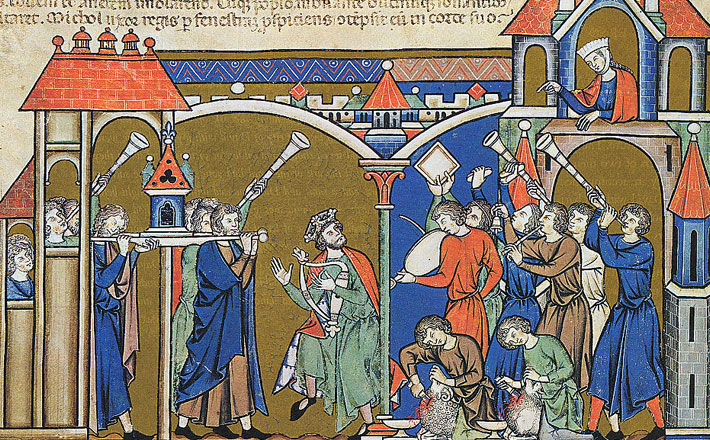Commentary on Amos 7:7-15
Amos 7 as the First Reading on this Sunday in July complements the Gospel Reading from Mark 6:14-29.
Both passages concern prophetic figures — Amos and John the Baptist — who are confronted because of their condemning, prophetic message. Amos is asked to leave the land of Judah; John is beheaded. Yet, their messages carry on today to this very Sunday when we hear their prophetic voices again and ponder again their significance as we seek to find our prophetic voices.
Prophets do not seem to be much appreciated on this Sunday! Their announcements of judgment are not well-received. They are perceived as a threat to the leadership, whether it be the mighty Herod or the local priest of Bethel, Amaziah.
The passage selected for today from Amos actually begins in the middle of the story. Verses 7-9 present in fact the third of three visions of judgment against Israel. First, Amos sees locusts eating away the spring growth (7:1-3). Next, Amos sees a shower of fire consuming the land (7:4-6). Finally, Amos sees a wall built with a plumb line.1 This vision is slightly more elaborate than the other two in that God asks Amos: “What do you see?” Amos responds with the item right in front of him — the plumb line. But God has a different sort of plumb line in mind.
Like a good children’s sermon uses an object lesson to convey its point, God presents an object to Amos. It is a fairly common object with a clear purpose. The plumb line functions to keep the wall vertically straight during construction. The plumb line uses lead (Latin for lead is plumbum) at the end of a string to judge how the wall is measuring up. It helps maintain the integrity of the building by providing a vertical reference point.
God, however, has a different use for the plumb line. God is setting a religious and ethical plumb line in the midst of the kingdom of Israel to see how they stand. The people fail to measure up.
They are not upright. The plumb line demonstrates their tottering and wavering.
Therefore, God will destroy the high places of worship and rise violently against Jeroboam’s house. The punishment against the cultic places and the king may indeed highlight the exact elements within Israelite culture that do not measure up. Both the prophetic books of Amos and Hosea condemn these high places as improper locations for worship of God.
These three visions by Amos cause quite the response from Amaziah, the priest in Bethel. He sends a message to King Jeroboam that Amos is conspiring against the king. Additionally, in his message, Amaziah quotes Amos’ judgment against the king. He doesn’t quite get the prophet’s quotation correct (although Amos will indeed say such things by the end of the chapter!), but it’s basically on target in spirit: Amos is prophesying about the death of Jeroboam and the disastrous fate of Israel. Amaziah seems to be particularly upset about the prophecy against the king and his kingdom.
Then, Amaziah, without a response from the king, confronts Amos. Amos should leave Judah at once and never prophesy at Bethel again “for it is a king’s sanctuary and a temple of the kingdom.” Again, Amaziah shows us his concern clearly. He is made nervous by Amos’ judgment against the king. The holy place at Bethel belongs to the king and his kingdom; Amaziah is supported by the king. This prophecy of Amos has direct and significance repercussions for this local priest.
We are always the most upset at our prophets when they seem to be questioning our way of life, not when they question the actions of those with whom we disagree.
Amos responds that he is not a professional prophet who can just pack up and move to the next city. In fact, he’s not from a line of prophets who receive their legitimacy through their prophetic ancestors. This is not a business or livelihood for Amos. Amos validates his prophetic words by noting that God called him while he was tending his flocks to prophesy to Israel. He says these words of judgment because God took him from his day job as a herdsman and sycamore tree dresser and made him a prophet.
Then, Amos delivers yet another prophetic judgment oracle in vv. 16-17, verses that are left out of the lectionary reading for this week. They are some of Amos’ most condemning and cruel words in the book.
In the book of Amos, the prophet is confronted by a priest, but his life is not taken away. He is able to continue to deliver his prophetic words to Israel. In the Gospel of Mark, John the Baptist is killed because of his prophecy and his confrontation with Herod. To speak prophetically in these passages is to come up against resistance, resistance from those who have a stake in the power and system under prophetic attack.
Notes:
1 Much scholarly discussion occurs about the exact meaning of the Hebrew word translated above and in the NRSV and NJPS as “plumb line.” It is legitimately not clear what precise object might be in mind here.


July 12, 2015